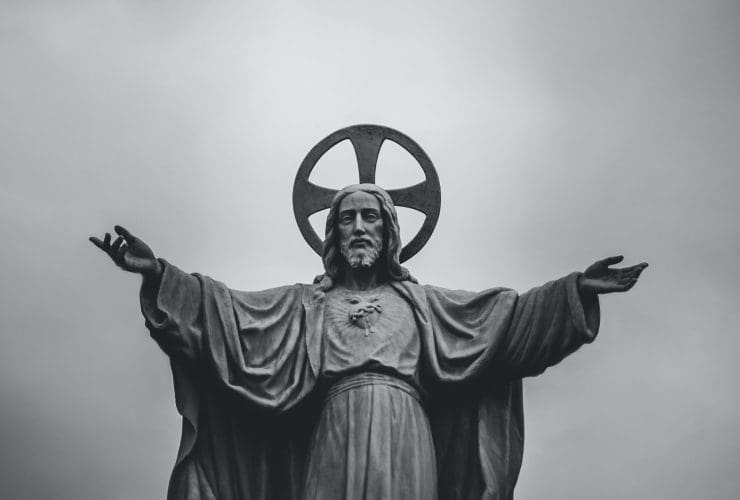Q:
“I posted this question because in the Old Testament some people were cursed with leprosy by God on them and their generations to come… Do those descendants today still carry that curse? Please reference 2 Kings 5:20-27, “Therefore the leprosy of Naaman shall cling to you and your descendants forever. And he went out from his presence leprous, as white as snow.”
Charles W.
Unfortunately, I don’t think a quick answer will do your concern justice given the global pandemic of COVID-19 that continues to ravage our world. In a time of crisis and isolation, one unanswered question can lead to another unanswered question. For those who struggle with doubt, your inquiry can now be cloaked in controversy and theological difficulties. Simply put: “If so, then why?” Why does God ordain sickness and disease such as leprosy or coronavirus? More specifically, does God truly give Gehazi and his descendants leprosy forever? And if so, what does the Bible mean by “forever”?
To answer your question directly, it’s extremely unlikely that Gehazi’s family line still lives on today. If leprosy did cling to Gehazi and his descendants, then, in all likelihood, they passed away long ago. In the ancient world, if a person was leprous, or even had signs of leprosy developing, they were immediately excommunicated from society and left to die alone, or at best, with other lepers. This is still the case in third-world countries today such as India, housing a third of the world’s poor. But what we lack in pedigree, we gain by understanding the text.
What does the Bible mean by “forever”?
In 2 Kings 5:27, and throughout the Old Testament, the English word we translate as “forever” is olam (עוֹלָם) in Hebrew, which has a very wide spectrum of meaning from “world” and “most distant times” (of antiquity or futurity) to “perpetual” and “eternity”. It’s important to know that the Septuagint frequently translates olam into aion (or eon), referring to a long age or limited period of time. In the context of v.27 specifically, this seems to be the most accurate rendering of the text. This same definition for olam is also found in Exodus 21:6 which implies the longevity of voluntarily servitude is for as long as one lives (compare ESV and NIV translations). Likewise, Deuteronomy 23:3-6 implies duration into the indefinite future, clarified in v.6, “…all your days forever”. In all three cases, olam is a temporal forever that is restricted to the concept of lifetime. Therefore, it is a permanent and perpetual condition from the moment it was spoken forward, with no clear end in sight. In fact, most instances where olam is used will refer to a vague, unspecified length of time into the near future, which is ultimately measurable, but not perceptible. Sort of like how we use hyperbole today such as “this will take forever” or “feels like forever ago”. In this context, then, a better translation for olam might actually be “from now on” or “continuously” to avoid any confusion with eternity. And, of course, a pronouncement spoken by a prophet of God ought to carry more weight than mere exaggeration.
For additional clarity, Solomon even uses this definition of olam in reference to the earth, “A generation goes, and a generation comes, but the earth remains forever.” (Ecclesiastes 1:4) From the speaker’s vantage point, forever begins at the moment of creation, however foggy, with no foreseeable end. In fact, the root word for olam is alam (עלם), which literally means, “what is hidden, concealed” in reference to a vanishing point or even “beyond the horizon” (tying back that concept of “world”). But not all concepts of forever fall under this category. There seems to be a lower form of forever which is temporal, and a higher form of forever which is eternal. The higher form being the purest rendering of the word.
If we take this “from now on” definition, and apply it to the past as well as the future, it more accurately describes God’s nature, “I am the Alpha and the Omega, the First and the Last, the Beginning and the End” (Revelation 22:13), “from everlasting to everlasting” (Psalm 90:2; 103:17) , and even, “I AM THAT I AM” (Exodus 3:14). Given that we progressively experience life in a forward arrow, from one moment to the next, it seems intuitive for our basic understanding of the “from now on” forever to inform how we understand eternity. By using the present moment as an anchor, the breadth of forever not only persists into futurity but expands into the indefinite distant past of antiquity.
Sorry for the longwinded clarification, but it’s important we try not to spiritualize this verse or make it bigger than it is. Elisha’s prophecy is not an ontological claim, it’s a biological one.
Sickness and healing
If this has not already loosened the grip of Gehazi’s descendants having leprosy “forever”, then it’s worth pointing out that this “from now on” definition of forever is contingent and conditional, which means it can be superseded and interrupted by God. In fact, all healing cases throughout the Bible act as theological signposts of new creation: the regeneration of souls and restoration of all things. And we see this fact in full view throughout the Gospels!
One of the most iconic attributes of Jesus’ ministry was healing. He not only healed lepers throughout his lifetime (Matthew 8:1-4; Luke 17:11-19), but in John 9, he heals a beggar who was born blind, which, for all intents and purposes, was forever – permanent and perpetual from the moment of birth. When pressed about why and “who sinned…that he was born blind?”, Jesus responded, “It was not that this man sinned, or his parents, but that the works of God might be displayed in him.” (John 9:3) In a similar way, God is calling all people to repentance (Acts 17:30) so that the works of God might be displayed in us.
God’s sovereignty isn’t arbitrary. Even though at times it might feel that way, we don’t have the bigger picture in view. This is a call of patience to underscore the perseverance of the saints, to reveal the hope we have in Christ our Lord. The hope we have is built on Godly character, character built on perseverance, and perseverance established through times of crisis and suffering (Romans 5:4). Suffering the Apostle Paul rejoiced over! The Apostle James, brother of Jesus, also likens times of sickness and suffering to the steadfastness of Job and the fervent prayers of Elijah – emphasizing the healing of soul over immediate physical restoration. Instead, he asks us to “Be patient, therefore, brothers, until the coming of the Lord.” (James 5:7-11, 13-20)
Whether leprosy or coronavirus, if there is anything God is not, it’s meaningless or gratuitous. And while God permits natural evil in the world, He nevertheless offers the eternal solution for healing: regeneration and the new creation to come. And what is more valuable than your soul? (Matthew 16:26) Your body can be bought, sold, and even be damaged goods, but the only one who has a price on your soul is Jesus Christ! — This is exactly what Gehazi failed to see. As a servant of Elisha, he watched the prophet heal people firsthand, like Naaman, in the name of God. Yet, he exploited it for his own material gain, disregarding the welfare of others. Nevertheless, repentance was always on the table; whether he repented or not is unknown. During these times of crisis, let’s not be like Gehazi, who was not only avaricious and self-seeking but blind to God’s movement.
In regard to modern day healing, if you believe that God is still alive and active today and continues to supernaturally heal, then this concern ought to recede even further from view. But if you hold to cessationism, which states that God does not and will not heal and all such miracles ceased with the Apostolic movement, then this question becomes much less about whether God will supernaturally heal us and more about if God will inspire people to heal us through medical and natural methods. Given that we live in the age of medicine with unprecedented vaccines, medical treatment, therapy, and healthcare systems that continue to improve, the concern of “forever” should fall out of focus just as much. After all, the cure for leprosy is championed by a plethora of Christian charities throughout the third-world. No matter your view, our God is a God of healing!
Thank you for your question Charles! I tried to round it out as much as I could. Hope it helps! –– God bless.

Matlock Bobechko is the Chief Operating/Creative Officer of Bible Discovery. He is an eclectic Christian thinker and writer, award-winning screenwriter and short filmmaker. He writes a blog on theology, apologetics, and philosophy called Meet Me at the Oak. He is also an Elder at his local church.






